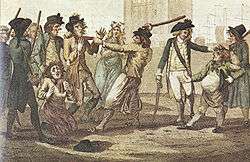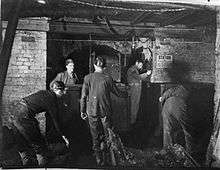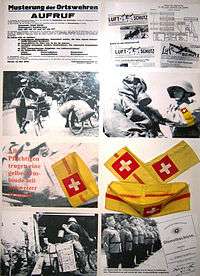Civil conscription
Civil conscription is the obligation of civilians to perform mandatory labour for the government. This kind of work has to correspond with the exceptions in international agreements, otherwise it could fall under the category of unfree labour. There are two basic kinds of civil conscriptions. On the one hand, a compulsory service can be ordered on a temporary basis during wartimes and other times of emergency, like severe economic crisis or extraordinary natural events to provide basic services to the population. These include, but are not limited to, medical care, food supplies, defense industry supplies or cleanup efforts, following a severe weather or environmental disaster for the duration of the emergency situation. Therefore, it generally makes striking illegal for the duration of the civil mobilization.[1] On the other hand, a revolving mandatory service may be required for a longer period of time, for example, to ensure community fire protection or to carry out infrastructure work at a local or community level.
| Conscription |
|---|
 |
| Conscription by country |
Legal situation

Civil conscription is an exception of the Forced Labour Convention of 1930 of the International Labour Organization (ILO) and therefore unfree labour shall not include:[2]
- any work or service exacted in virtue of compulsory military service laws for work of a purely military character;
- any work or service which forms part of the normal civic obligations of the citizens of a fully self-governing country;
- any work or service exacted from any person as a consequence of a conviction in a court of law, provided that the said work or service is carried out under the supervision and control of a public authority and that the said person is not hired to or placed at the disposal of private individuals, companies or associations (requiring that prison farms no longer do convict leasing);
- any work or service exacted in cases of emergency, that is to say, in the event of war, of a calamity or threatened calamity, such as fire, flood, famine, earthquake, violent epidemic or epizootic diseases, invasion by: animal, insect or vegetable pests, and in general any circumstance that would endanger the existence or the well-being of the whole or part of the population;
- minor communal services of a kind which, being performed by the members of the community in the direct interest of the said community, can therefore be considered as normal civic obligations incumbent upon the members of the community, provided that the members of the community or their direct representatives shall have the right to be consulted in regard to the need for such services.
Types of civil conscription
The civil conscription services can be classified into three basic types:
Civil conscription due to extraordinary events
In times of extraordinary events, such as in times of war, in economic crisis, in the event of natural disasters or during the occurrence of epidemics or pandemics, a civil duty may be established to perform the tasks deemed necessary by the government for a certain period of time, to ensure the restoration of former status quo. These important tasks include the basic supply of the population, such as medical care, food supply, the defense industry for the duration of the war or a state of emergency, and the removal of damage to the infrastructure after severe weather or environmental disasters.
Civilian conscription for the benefit of the community
A government can order a civil service duty to be performed repetitive for a longer period of time, for example to ensure the fire protection of a municipality or to carry out simple work at the municipal level, that smaller municipalities are unable to do financially or due to lack of manpower.
Civilian duty to strengthen "national values"
Some countries have implemented a compulsory service for younger age groups or educational groups to convey "national values" and to strengthen national cohesion, which in part has to be done in military, social or school-like institutions.
History of civil conscription
Belgium
To prevent a doctors strike the Belgium government, in April 1964, issued a civil mobilization order for hospital doctors and military doctors.[3]

Czechoslovakia
During the communist rule in Czechoslovakia the government announced a non-remunerated activity programm called Action Z (in Czech: Akce Z ) for the population. Officially, it was a voluntary work, but in fact it was mandatory. The participation at the Action Z programm was documented and citizens who did not participate or whose participation was unsatisfactory, were threatened with consequences at their regular work.
Germany
East Germany
In East Germany the officially volunteer Subbotnik service was de facto obligatory the population. With this service, the local communities had to countervail the deficits of the planned economy by forcing the citizens to maintain the local infrastructure.
Nazi Germany
Apart from the use of forced labour under German rule during World War II, the compulsory use of the Nazi German civilian population in the Reich Labour Service as early as 1935 was a appliance of the Nazi labor market policy.
Greece
During the during Greek debt crisis the Greek government decreed civil conscription orders for different occupational groups, that where necessary to maintain basic services for the population.[4][5][6]

| Year | Workers |
|---|---|
| 2010 | Truck drivers[7] |
| 2011 | Municipal cleaning staff |
| 2013 | Workers in Athens metro, tram and electric railway[8] |
| 2013 | Maritime workers [9] |
| 2013 | High school teachers[10] |
| 2014 | Electricity power workers[11] |
Seychelles
The National Youth Service (NYS) was a youth service program implemented in 1981 by the government of Seychelles that lasted two years until 1991, when it was reduced to a period of one year. It was a formerly compulsory civil service and included traditional educational curriculum, political education and paramilitary training. The Seychellois opposition opposed the program on the grounds, that it allegedly indoctrinated young adults with the ruling Seychelles People's Progressive Front's socialist ideology and that it rarely allowed its participants to visit their families. This mandatory service was ceased in November 1998.
United Kingdom
Due to a labour shortage between December 1943 and March 1948, because of World War II and the aftermath, the British government started to draft civil conscripts, the so-called Bevin Boys, for the work in coal mines.[12]
Current examples of Civil Conscription

France
In 1998 the Journée Défense et Citoyenneté (JDC), the "Defence and Citizenship Day", was established by the French President, Jacques Chirac, after suspending the conscription for the military service. It is a one-day program that deals with citizenship, Duty of Remembrance, awareness on defence, army, nation, European issues etc.[13]
In 2019, President Emmanuel Macron introduced a compulsory service, the Service national universel (SNU), the "General National Service", which will be mandatory for all citizens aged 16–25 from 2021 onwards. It lasts for one month, the service can be done in both civilian and military institutions. The aim of this general civil conscription is to communicate French values, to strengthen social cohesion and to promote social engagement.[14][15][16]
Federal Republic of Germany
Federal level
Beside the draft of male citizens for the military service, which is suspended for peacetime, the German constitution allows civil conscription as well. In addition to the military service in the case of the "State of Defence", female citizens between the ages of 18 and 55 could be called to perform medical duties, male citizens could be drafted for a mandatory service in the border guard or in a civil protection force. If required, the freedom to practice one's profession in the event of tension and defense may be limited.
State level
Depending on the respective state´s legislations and in addition to the - in theory possible - mandatory civil service obligations at the federal legislation level, there are three more civil conscription services possible, that allow communities to draft citizens:
- the Compulsory Fire Service (German: Pflichfeuerwehr), which in fact is in force in a handful of communities,
- the Dyke Relief Service (German: Deichhilfe), the draft of citizens by communities in the case of floodings and crevasse, and
- the Hand and hitch-up services (German: Hand- und Spanndienste), which is still enforced in small communities to maintain their infrastructure[17]
Political discussions and proposals
From time to time there are proposals for civil conscription of all citizens for general (social) services, that are considered to be legally problematic and could violate not only international agreements and the regulations of the German constitution as well, without a constitutional amendment.[18][19][20] Those proposals are the establishment of a Soziales Pflichtjahr (German for "obligatory year of social service") or Bürgerarbeit (German for "citizens´ work"), a workfare-style draft for unemployed persons. In 2020, during the COVID-19 pandemic the state governments of Lower Saxony and North Rhine-Westphalia planned to establish a compulsory service for doctors and medical staff in the event of an epidemic and the legislative proposals were already in preparation. However, after protests by medical associations and other interest groups, the plans were ceased.[21][22][23][24]
Nigeria
In Nigeria there is no military conscription, but since 1973 graduates of Nigerian universities and polytechnics are required to serve in the mandatory National Youth Service Corps (NYSC). The Nigerian government wants to involve Nigerian graduates in nation building and the development of the country. The compulsory service lasts one year and graduates are ineligible for employment in governmental establishments (and most private establishments) until they have completed the mandatory service or obtained the relevant exemptions.

Switzerland
In general, the political system in Switzerland is characterized by the so-called militia-system, where civilian service tasks basically are carried out on a part-time basis. Currently, not only the compulsory military service in the Swiss Armed Forces is backed on the militia-system, many political and civilian service duties are maintained by the militia secondary activity. For example, members of cantonal or federal parliaments or governments in general engage on part-time basis.
Unlike to the organization of fire brigades in most countries as professional or voluntary fire departments, in Switzerland there are basically militia fire brigades, compulsory fire brigades with drafted members.
The duty in Swiss civil defense and protection institutions is mandatory for inhabitants as well.[25]
See also
- Community service
- Himeyuri Students
- National service
- Workfare
References
- https://www.eurofound.europa.eu/efemiredictionary/civil-conscription-0
- "Convention C029 - Forced Labour Convention, 1930 (No. 29)". www.ilo.org.
- https://www.nytimes.com/1964/04/13/archives/belgian-doctors-answer-callup.html
- http://www.keeptalkinggreece.com/2013/05/11/greek-govt-to-issue-86000-civil-mobilization-orders-for-teachers-before-the-strike/
- "Archived copy". Archived from the original on 18 March 2017. Retrieved 28 January 2015.CS1 maint: archived copy as title (link)
- http://www.greeklaws.com/pubs/content.php?type=vivliografia&id=244
- http://www.ekathimerini.com/69520/article/ekathimerini/news/still-no-gas-as-truck-drivers-put-foot-down
- http://www.ekathimerini.com/147984/article/ekathimerini/news/metro-strike-ends-as-workers-forced-to-return-to-jobs
- "Greek government proceeds with conscription of maritime workers". protothema.gr. Archived from the original on 4 March 2016. Retrieved 31 July 2015.
- https://www.rt.com/news/austerity-measure-teachers-strike-192/
- https://www.ft.com/content/dd0538c8-0469-11e4-ab6a-00144feab7de#axzz3hN2aIhku
- https://web.archive.org/web/20090703100910/http://www.berr.gov.uk/energy/sources/coal/bevin/page41441.html
- https://www.defense.gouv.fr/jdc
- https://www.education.gouv.fr/cid136561/le-service-national-universel-snu.html
- https://www.france24.com/en/20190616-france-trial-macron-new-compulsory-national-service-teen-military
- https://www.bbc.com/news/world-europe-48755605
- http://www.rechtslexikon.net/d/hand-und-spanndienste/hand-und-spanndienste.htm
- https://www.bundestag.de/resource/blob/436804/3cbeab33e17eb8e717688be45ee74bfd/WD-3-165-16-pdf-data.pdf
- https://www.bundestag.de/resource/blob/436784/bc12a4dffc0661a0d9abca98c41457d8/wd-3-154-16-pdf-data.pdf
- https://www.lto.de/recht/hintergruende/h/allgemeine-dienstpflicht-einfuehrung-verfassung-wehrpflicht-zivildienst/
- https://www.welt.de/regionales/niedersachsen/article208935023/Dienstverpflichtung-fuer-Aerzte-und-Pfleger-aufgegeben.html
- https://www.braunschweiger-zeitung.de/niedersachsen/article229255610/Koalition-rueckt-von-Dienstverpflichtung-fuer-Aerzte-und-Pfleger-ab.html
- https://www.zeit.de/arbeit/2020-04/corona-krise-aerzte-pflegekraefte-arbeit-verpflichtung-armin-laschet
- https://www.zeit.de/arbeit/2020-04/corona-krise-aerzte-pflegekraefte-arbeit-verpflichtung-armin-laschet/seite-2
- "Archived copy". Archived from the original on 2017-09-20. Retrieved 2019-10-07.CS1 maint: archived copy as title (link)